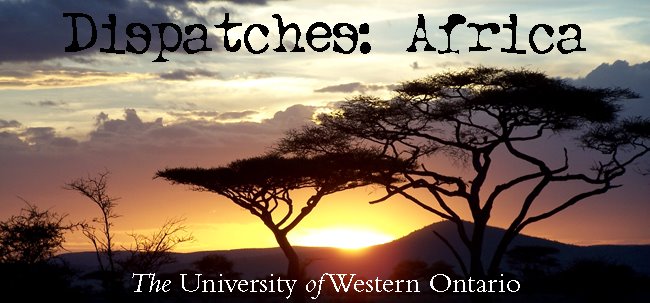 London, Ontario, Canada - Upon my return from Kenya and Tanzania last November, I was tired and confused. I'm not sure it was so much the 'reverse culture shock' many describe, but having my entire world view so completely recalibrated was incredibly disorienting. A restless quiet descended over me.
London, Ontario, Canada - Upon my return from Kenya and Tanzania last November, I was tired and confused. I'm not sure it was so much the 'reverse culture shock' many describe, but having my entire world view so completely recalibrated was incredibly disorienting. A restless quiet descended over me.Only a three-week piece of life's puzzle, this first foray to Africa filled in more holes and taught me substantially more about myself, the world and my responsibility in it than many much larger swatches of time. The lessons I learned were certainly far greater than any I imparted.
For weeks on end, though, night after night, dream after dream, a vivid tableau of images of Africa - of poverty, of war, of disease, of displacement, of happiness - played out consecutively in restless sleep, to the point of resentment. I yearned for dreams of something else for a while. Daylight hours were already devoted to processing my experiences and I found myself frustrated that I could not find solace in darkness. I felt haunted, and hunted, by memory. This, of course, led to feelings of guilt, more exhaustion and further confusion. I had not yet found my peace, torn between having to learn and hoping to make a difference, however small.
This is all in spite of the overwhelmingly positive nature of the experience for me individually. While the past few years have been rife with personal challenges, frustrations and pain, this opportunity to discover the world has blessed me with perspective. Despite the difficulties we face, we are extremely fortunate. At the end of the day, I've come to believe the biggest difference between our worlds is just opportunity. And, I've long posited that we could become much better societies if everyone had the chance to see how others less fortunate live. And triumph. Perhaps then, the exorbitance of our holidays, the aggression on our roads, the little time we spend with our families and the miasma of petty infighting that surrounds us all could be put into perspective.
As a colleague of mine - a Kenyan herself - recently said to me, Africa has got into my blood. I think about my time there every day and have spent the last year exploring options that would allow me to return. As I re-read my writings, however, I realize how much my perspective has changed and how having had the occasion to distance myself from my first experience will allow me to return as less of a wide-eyed naif. It has been a growing process borne of reflection and discussion; the initial journey was merely the catalyst for change.
The dreams have again long-since begun: I leave for Rwanda in 11 days.
Over the past couple of months, I have immersed myself in a dozen books about East Africa - its people, history, politics, problems and opportunities. Given my destination, I've also devoted a fair bit of attention to the country's 1994 genocide in which approximately 800,000 people were killed over 100 days. It's beyond comprehension. From Roméo Dallaire's Shake Hands with the Devil to Fergal Keane's Season of Blood: A Rwandan Journey to Scott Strauss's very analytical Order of Genocide, I found the disturbingly named We Wish to Inform You That Tomorrow We Will be Killed With Our Families by Philip Gourevitch to be, for me, the most accessible and informative on the subject.
There were movies, too, including the well-known Hotel Rwanda and Shake Hands with the Devil, and the lesser-known Sometimes in April.
I'm looking forward to seeing first-hand how Rwanda has begun to heal over the past 14 years and how it is progressing toward becoming a country where the word 'genocide' is no longer used in the first line of every story about it. With a year of reflection behind me, I feel better prepared to learn from my experiences and to be able to actually provide some expertise where it's needed, while contributing something meaningful to development, including development of self. One person may not be able to change the world, but you cannot underestimate the impact one can have, even if it's on individual lives. By affecting individuals, we can, together, effectuate positive change.
I'm young; there's still plenty of time ahead for sleep.




